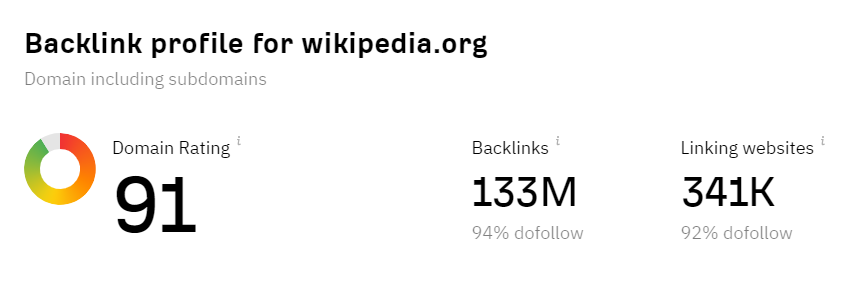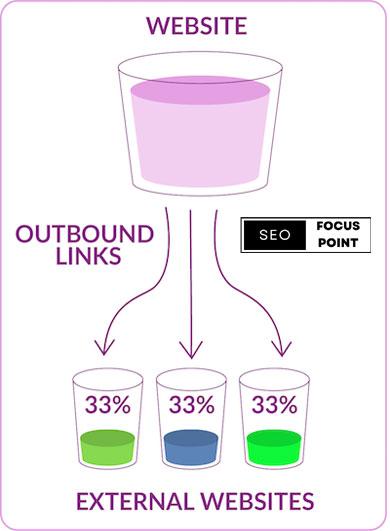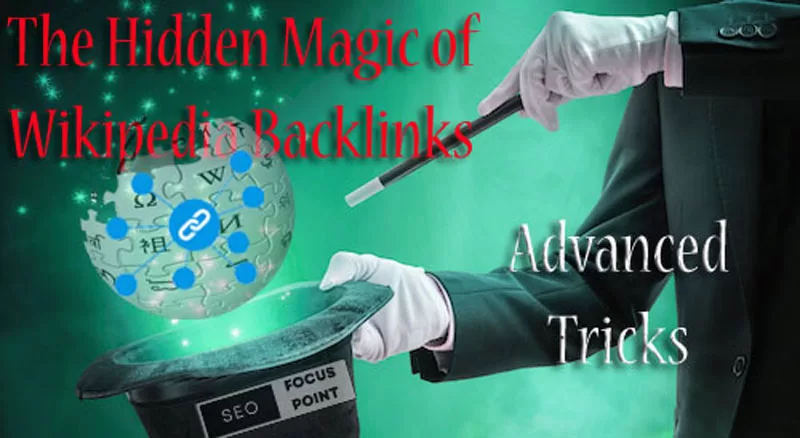Wikipedia Backlinks is a dream project for an SEO expert or link builder. You may tell, it’s a super easy process to build a backlink in Wikipedia. But do you know how many people are blocked by moderators during link building? Web Tribunal said that Wikipedia has more than 42 million registered usernames among them only 1% of them actively edited articles from December 2021 to January 2022. Most of the Inactive users are either account or IP blocked during link building. Wikipedia does not allow spammy links or promotional activity. The question is how do we build backlinks from Wikipedia? Here is our Hidden Magic, which we will disclose in this article.
Table of Contents
What is Wikipedia Backlinks?
Wikipedia article contains a lot of links as a source. If your website may be a source of any information in an article you may get a backlink.
Wikipedia backlinks refer to hyperlinks on external websites that lead to pages on Wikipedia. These links can enhance a website’s credibility and search engine visibility.
They are often used as references to provide readers with additional information on a specific topic. While Wikipedia itself doesn’t have a traditional backlink system, these external references contribute to the authority of Wikipedia pages on search engines.
Pros and Cons of Wikipedia Backlinks
Wikipedia backlinks can offer significant benefits in terms of credibility, SEO, and content enrichment. However, it’s important to use them strategically and not solely rely on them for information or backlink diversification. Balancing the pros and cons and integrating Wikipedia backlinks thoughtfully can contribute positively to your content and website’s online presence.
Pros of Wikipedia Backlinks:
- High Authority Source: Wikipedia is a well-established and respected source of information. Backlinks from Wikipedia can enhance the credibility of your content in the eyes of both readers and search engines.
- SEO Boost: Backlinks from authoritative websites like Wikipedia can positively impact your website’s search engine rankings. Search engines often consider the quality and relevance of backlinks when determining search result positions.
- Increased Visibility: Wikipedia backlinks can lead to increased visibility in search engine results. Higher rankings mean more organic traffic to your website.
- Contextual Enrichment: Wikipedia backlinks can provide readers with additional context and in-depth information on a topic. This can enhance the value of your content and establish you as a reliable source of information.
- Natural Link Profile: Having diverse and high-quality backlinks, including those from Wikipedia, contributes to a more natural and balanced link profile, which is favored by search engines.
Cons of Wikipedia Backlinks:
- Linking Challenges: Wikipedia editors are vigilant about maintaining the quality of their content. If your link doesn’t add genuine value to the Wikipedia page, it might be removed by editors. Additionally, Wikipedia’s external linking policies can be strict. It’s important to use a variety of reputable sources to provide a well-rounded view. Wikipedia Guideline is established on five Piller.
- Dynamic Content: Wikipedia articles can be edited by multiple contributors, leading to changes in content over time. If you link to a specific section that gets altered, the context of your backlink might change.
- Risk of Inaccuracy: While Wikipedia strives for accuracy, errors can still occur. If you rely heavily on Wikipedia for information, you might inadvertently include inaccurate information in your content.
- Competitive Landscape: Many websites and authors attempt to secure Wikipedia backlinks, making it a competitive endeavor. Not all link requests may be successful, and it can take time and effort to establish relevant links.
The SEO Benefits of Wikipedia Backlinks
Google Loves Wikipedia Backlinks. Even Google uses a knowledge graph that comes from Wikipedia.
Google Webmaster Trends Analyst John Mueller said ” “We use the knowledge graph (which comes from various places, including Wikipedia) to try to understand entities on a page.”

But what about Wikipedia Backlinks? Google directly does not acknowledge the SEO Benefits of Wikipedia Links.
John Mueller verified the futility of actively seeking Wikipedia backlinks in a Reddit post from 2021:
“Randomly dropping a link into Wikipedia has no SEO value and will do nothing for your site. All you’re doing is creating extra work for the Wikipedia maintainers who will remove your link drops. It’s a waste of your time and theirs.”
But if you have to think about the Domain Authority, Backlinks, and Referring domain position of Wikipedia, you may realize the trustworthiness of this website.

When you will got the link from Wikipedia, It will bring you hidden benefits beyond link juice and traffics.
There are so many SEO benefits of Wikipedia Backlinks. Most of them are discussed below:
High Domain Authority
Wikipedia has a very high domain authority due to its credibility and popularity. Backlinks from high-domain-authority sites like Wikipedia can positively impact your site’s own authority and search engine rankings. Wikipedia enjoys an exceptionally high Domain Authority due to its vast and reliable content, strict editorial guidelines, and extensive link profile from reputable sources. Its comprehensive coverage, open editing, and recognition as a trustworthy information source have led to widespread linking and high traffic. Consequently, obtaining a backlink from Wikipedia can provide substantial SEO benefits, as it signifies authority, trustworthiness, and relevance to search engines, enhancing a website’s rankings and visibility.
Authority and Trust
Wikipedia is a prime example of a website that embodies both authority and trust in the online world. With its extensive and well-researched content, strict editorial guidelines, and widespread recognition, Wikipedia holds a high level of authority in providing reliable information across various topics. Its massive link profile from reputable sources further solidifies its authoritative status.
Moreover, Wikipedia’s commitment to neutrality, comprehensive citations, and collaborative editing fosters a strong sense of trustworthiness. Users and search engines alike consider Wikipedia a dependable source due to its transparent content creation process and history of accurate information.
As a result, Wikipedia’s exceptional authority and trustworthiness contribute significantly to its high search engine rankings, making it a go-to reference for both individuals seeking knowledge and search engines aiming to provide credible results.
Link Juice
Wikipedia backlinks are mainly nofollow but they can pass link juice to your website. Link juice refers to the SEO value and authority that is transferred from one page to another through hyperlinks. This can potentially boost your site’s search engine rankings.

Link juice refers to the value or authority that is passed from one web page to another through hyperlinks. When a high-authority website like Wikipedia links to another website, it can pass on link juice, which can positively impact the linked site’s search engine rankings and visibility.
Obtaining link juice from Wikipedia can be particularly advantageous due to Wikipedia’s high authority and trust in the eyes of search engines. When Wikipedia links to your website, it can potentially:
- Boost Authority
- Enhance Relevance
- Increase Trust
- Accelerate Indexing
- Drive Referral Traffic
Increased Visibility
Wikipedia articles often rank highly in search engine results. If your website is linked from a relevant Wikipedia page, it can lead to increased visibility and organic traffic to your site.
Relevance and Context
Wikipedia backlinks are usually placed in contextually relevant articles. This relevancy can enhance the value of the backlink in the eyes of search engines and users, improving the overall SEO impact.
Anchor Text Optimization
Wikipedia backlinks often use relevant anchor text that describes the linked content. Anchor text plays a role in telling search engines what the linked page is about, potentially improving your page’s ranking for specific keywords.
Indexing and Crawling
Search engine bots frequently crawl Wikipedia pages, which means that if your website is linked from Wikipedia, search engines are likely to discover and index your site faster.
Referral Traffic
Wikipedia can generate referral traffic to your site. Users who click on the backlink in a Wikipedia article might be genuinely interested in your content, leading to more engaged visitors.
Long-Term Value
Wikipedia links tend to have long-lasting value. Unlike some other websites that might remove or change links over time, Wikipedia links are relatively stable, providing a consistent source of SEO benefits.
However, it’s important to note that obtaining backlinks from Wikipedia is not straightforward. Wikipedia has strict guidelines and a strong community of editors who actively monitor and maintain content quality. Here are a few considerations:
- Relevance: Backlinks should be genuinely relevant to the content of the Wikipedia article and provide additional value to readers.
- Credibility: The linked website should be a reliable and authoritative source, not a promotional or spammy site.
- Neutral Point of View (NPOV): Wikipedia articles maintain a neutral tone. The linked content should not be overly promotional or biased.
- Citations: Backlinks should be supported by credible sources and cited appropriately.
- Contributions: Editors who have a conflict of interest (such as promoting their own websites) should be transparent and adhere to Wikipedia’s guidelines for self-promotion.
The magical process of getting Wikipedia Backlinks
Here’s a step-by-step process for building Wikipedia backlinks:
Step1: Open a Wikipedia Account:
- Create a Wikipedia account to simplify the process of generating backlinks.
- After 4 days and at least 10 edits, gain permission to edit semi-protected pages.
- Once your account is 30 days old and you’ve made at least 500 edits, you can edit extended protected pages.
Step 2: Create Your Keyword Data Set:
- Define your target keywords.
- Perform preliminary keyword research.
- Compile a list of 25-50 general keywords related to your niche.
Step 3: Look for Wikipedia Backlink Opportunities:
- Identify two types of backlink opportunities: dead links and new links. Dead links can easily find through an online tool wiki grabber.
- For dead links, search Wikipedia’s Dead Links Category List or use Google’s advanced search operator to find relevant pages.
- For new links, search wiki pages for sections that could benefit from new citations.
Step 4: Create a Resource on the Subject:
- Create high-quality content on your website that can serve as a replacement for dead links or a new citation resource.
- Use the Wayback Machine for dead links to find archived content and recreate it on your site.
Step 5: Add a Backlink to the Wikipedia Page:
- Assess the Wikipedia page to find the best spot for your backlink.
- Check page discussion, history, and similar websites for guidance.
- Cite your website correctly using inline citations to ensure the backlink’s validity.
Step 6: Review Your Content Regularly:
- Periodically review your backlinked content to ensure it’s still active and relevant.
- Monitor for changes or replacements by competitors and address any issues promptly.
Step7: Use Wikipedia to Plan Content:
- Use Wikipedia as a resource to plan upcoming content related to pages that need improvement.
- Create detailed plans, prioritize content, and shape it to provide value and backlink opportunities.
Remember, while Wikipedia backlinks can be beneficial, they should be part of a broader SEO strategy. Combining various strategies will yield the best results for improving your website’s authority, visibility, and search engine rankings.
You must avoid building Wikipedia backlinks
When building Wikipedia backlinks, it’s important to adhere to Wikipedia’s guidelines and best practices to ensure that your efforts are genuine and ethical and contribute positively to the community. Here are some key things to avoid during the process of building Wikipedia backlinks:
- Avoid Self-Promotion: Wikipedia is not a platform for self-promotion or advertising. Do not add links to your website solely for promotional purposes, as this goes against Wikipedia’s policies and can result in your edits being removed.
- Avoid Adding Irrelevant Links: Backlinks should be relevant to the content and context of the Wikipedia article. Adding links that are not directly related to the topic is discouraged and may be flagged as spam.
- Avoid Biased Edits: Wikipedia articles should maintain a neutral point of view (NPOV). Avoid making edits or adding links that show bias or favoritism toward a particular perspective, organization, or individual.
- Avoid Editing Your Own Article: Editing your own Wikipedia article directly is generally discouraged, especially if you have a conflict of interest. Instead, suggest edits on the article’s talk page and let the community review and implement them.
- Avoid Overlinking: Excessive linking within an article can be seen as spammy and disruptive. Limit the number of backlinks you add to ensure they enhance the article’s quality and readability.
- Avoid Copyright Violations: Do not copy and paste content from your website or other sources directly into Wikipedia. Plagiarism is not tolerated, and all content added to Wikipedia should be original or properly attributed.
- Avoid Removing Valid Tags or Warnings: If an article has maintenance tags, such as those indicating neutrality issues or citations needed, do not remove them without addressing the underlying concerns. Removing such tags without resolving the issues can lead to reversions or removal of your edits.
- Avoid Edit Wars: If another editor disagrees with your edits or removes them, avoid engaging in edit wars. Instead, engage in civil discussion on the article’s talk page to resolve disagreements.
- Avoid Adding Non-Notable Information: Wikipedia articles should focus on notable and verifiable information. Do not add information that lacks reliable sources or is not relevant to the topic’s notability.
- Avoid Creating Duplicate Articles: Before creating a new article, search to ensure that a similar topic or subject does not already exist on Wikipedia. Duplicate articles can be deleted as per Wikipedia’s guidelines.
- Avoid Using Wikipedia for SEO Only: While building Wikipedia backlinks can offer SEO benefits, remember that Wikipedia is a platform for sharing reliable information. Focus on contributing valuable content rather than solely using it for SEO purposes.
By following these guidelines and avoiding these common pitfalls, you can engage in ethical and effective Wikipedia backlink building that contributes positively to the Wikipedia community and enhances your website’s credibility.
In summary, the allure of Wikipedia backlinks holds the key to enhancing your online presence. These links, sourced from the esteemed domain of Wikipedia, possess the power to bestow credibility, authority, and heightened visibility upon your content. By strategically weaving these backlinks into your strategy, you can unlock a range of benefits, from improved search engine rankings to a more engaging user experience.
The magic of Wikipedia backlinks is particularly evident in their impact on SEO. As esteemed authorities, these backlinks can elevate your website’s ranking in search results, translating into increased organic traffic and broader audience reach.
Their potency extends beyond SEO, as Wikipedia backlinks invite users to delve deeper into your content. By providing valuable context and additional information, these links enrich the user experience, fostering a deeper connection and prolonged engagement.
In the realm of keywords, Wikipedia backlinks offer an elegant solution. By aligning your content with established Wikipedia keywords, you amplify your content’s relevance and potential search visibility.
Moreover, these backlinks contribute to the diversity of your link profile, signaling to search engines a well-rounded and credible online presence.
The enduring impact of Wikipedia backlinks is supported by the stalwart quality of Wikipedia’s content. Its rigorous standards ensure that your backlinks remain influential over time, adding to their long-term value.
As we explore this landscape, it’s important to wield this power responsibly. Thoughtfully integrating Wikipedia backlinks, chosen for their relevance, can create a harmonious synergy that resonates with both search engines and users.
Discover the hidden magic of Wikipedia backlinks and transform your digital strategy today. To stay updated with more insights and tips, subscribe to our email newsletter for exclusive content and the latest developments in the world of online presence. Join our community and let’s embark on this journey together.

